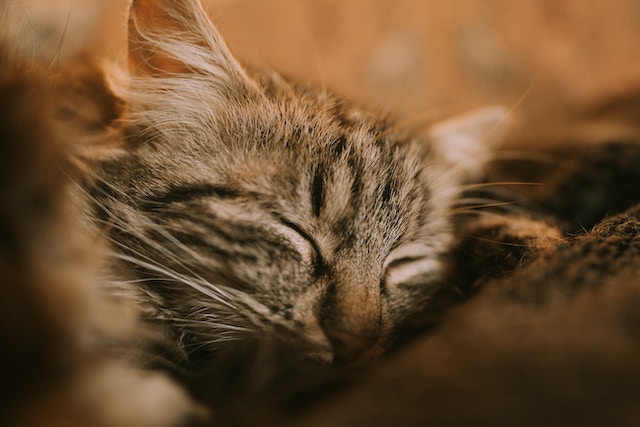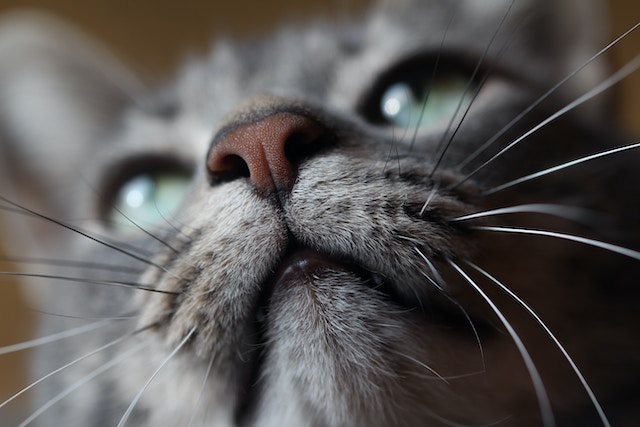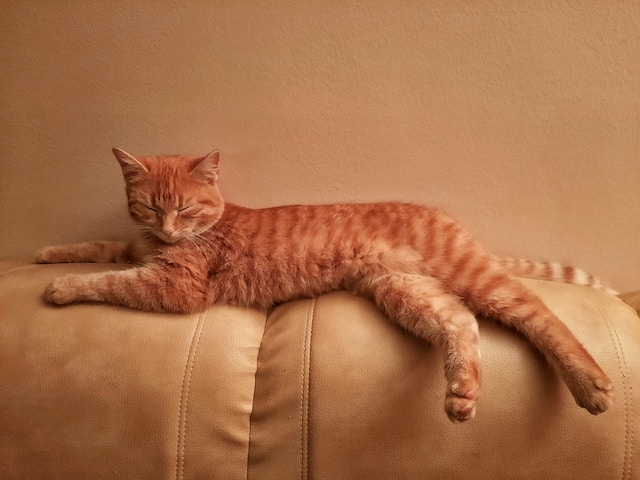Do you ever wonder why cats’ noses become wet and cool when they purr? It’s a common question amongst cat owners, but it turns out there’s a pretty interesting explanation.
You’ll be shocked to learn why cats’ noses get wet and cool when they purr!
What is Purring?
Purring is a vibrating sound that cats produce through the movement of their diaphragm and larynx. It is often associated with a pleasurable or content feeling in cats and can occur in various situations, including when they are petted, relaxed, or in pain.
Why Do Cats Purr?
Cats purr when they’re happy, relaxed, or contented, and it’s their way of communicating with their owners. However, the exact reason why cats purr is still a mystery to scientists and veterinarians.
Additionally, purring increases a cat’s heart rate and breathing rate, which can also play a role in wetting their noses.
It’s also believed that cats use purring for self-healing and pain relief, as the vibrations of their purring can help heal bones, provide comfort, and promote relaxation.
Pro tip: If your cat’s nose is overly wet when they purr, it could be a sign of an underlying medical condition, and a visit to the vet is recommended.
Why Do Cats’ Noses Get Wet When They Purr?

Some experts believe cats wet their noses when purring to enhance their sense of smell, which is crucial for hunting and detecting prey.
Others suggest that it’s a way to regulate their temperature and maintain hydration levels in their bodies during purring. Yet, some studies indicate that the wetness might be due to the secretion of watery mucus, also known as serous fluid. This secretion could happen due to the vibration of the muscles, which occurs when the cat purrs.
Although the exact reason behind cats wetting their noses while purring is still unknown, one thing is for sure – this unique behavior only adds to our love and captivation for these furry felines.
Physiology of Purring
The physiology of purring is a complex process involving cats’ nervous, respiratory, and circulatory systems. When a cat purrs, it not only expresses pleasure but also helps heal their body, calm their nerves, and communicate with other cats.
Interestingly, when a cat purrs, it also causes vibrations in their nose and throat tissues, which draws in more air and can result in wetness on their noses. This happens when the mucous membranes lining the nasal cavity become moist, and the excess moisture drips out from the nose.
Therefore, a cat’s wet nose can suggest that it is purring. Other reasons why cats can have a wet nose include environmental factors or illnesses such as respiratory infections, allergies, or a fever.
However, if your cat’s wet nose persists for a long time, consult a vet to rule out potential health issues.
Pro tip: Always observe changes in your cat’s behavior, including the appearance of their nose. This can help you detect any underlying health issues early and keep your cat healthier.
Possible Causes of Wet Noses in Cats

It is common for cats’ noses to become wet while they purr, which is a natural physiological response. However, a constantly wet nose or increased wetness can indicate health problems.
Some possible causes of wet noses in cats include:
| 1. Normal secretion: | Cats produce a clear fluid to keep their nasal passages moist, which helps enhance their sense of smell. |
| 2. Allergies or infections: | Wetness in the nose can be a sign of allergies, viral or bacterial infections, or a foreign body inhaled or lodged in the nose. |
| 3. Hyperthyroidism: | This condition can cause increased nasal discharge and watery eyes. |
| 4. Dental issues: | Dental problems like gum disease, cavities, or tooth abscesses can result in nasal discharge. |
If you notice excessive wetness or any other unusual discharge, consult a veterinarian for a proper diagnosis and treatment.
Wrapping Up
In conclusion, the reason why cats’ noses get wet when they purr is that purring involves the contraction and relaxation of the diaphragm muscle while breathing. This action causes a vibration in the nasal cavity, which stimulates the glands in the nose to produce mucus. As a result, the cat’s nose becomes wet or moist.
While this phenomenon is normal, excessive mucus production or a runny nose could indicate an underlying health issue that requires veterinary attention.
As responsible pet owners, it’s essential to monitor our feline friends’ health and seek medical care when necessary to ensure that they live healthy and happy lives.
Frequently Asked Questions
1. Why do cats’ noses get wet when they purr?
When cats purr, they vibrate their vocal cords and throat muscles. This creates a pressure change in their sinuses, which can cause their noses to become moist or even to run.
2. Is a wet nose a sign of good health in cats?
Generally, a moist or slightly wet nose is a sign of good health in cats. It can indicate that their sinuses are functioning properly and that they are well hydrated.
3. Can cats purr without a wet nose?
Yes, cats can purr without their noses becoming wet. While a moist nose can be a side effect of purring, it is not essential to the process.
4. Should I be concerned if my cat’s nose is excessively wet?
If your cat’s nose is overly wet or constantly running, it might be a sign of an underlying health issue. In such cases, it’s best to consult with a veterinarian to determine the cause and appropriate treatment.
5. Can cats catch colds like humans do?
While cats cannot catch colds in the same way humans do, they can contract respiratory infections that have similar symptoms, including a runny nose and sneezing.
6. Can a cat’s wet nose indicate the weather?
There is an old myth that a cat’s wet nose can predict the weather. However, there is no scientific evidence to support this claim. A wet nose is simply a natural and normal bodily function for cats.
Wrapping Up
Cats’ noses become wet when they purr for a variety of reasons. The moisture helps to keep the nostrils open and clear of dust, allergies, and other irritants. It also helps to lubricate the skin and keep it healthy.
Additionally, the moisture can aid in cooling the cat down while they rest or sleep. Ultimately, cats’ noses getting wet when they purr is a sign that they are relaxed and content with their environment.
Read Next: A Simple Guide on How to Groom a Cat

